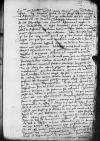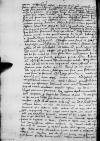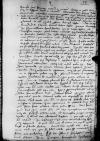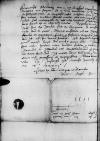Ex ⌊Oeniponte⌋ semel ad te ⌊⌋. Quominus saepius id fecerim, in causa fuit, quod arbitrarer me cum magnifico oratore vestro domino ⌊Nicolao Nyptzitz⌋ venturum in ⌊Poloniam⌋ ad res componendas inter serenissimum ⌊Rhomanorum regem⌋ et ipsius ⌊adversarium⌋ in ⌊regno Hungariae⌋, quam ad rem plenum et sufficiens mandatum habui et adhuc habeo, in quantum serenissimo ⌊Rhomanorum regi⌋ videretur. Iam bimestre est, quod ⌊hic⌋ fui, neque multo minus est, quod huc advenit ⌊Nyptzitz⌋ noster, cum quo fuit mihi arctissima consuetudo et familiaritas. Ita vero haesimus animi, ut de die in diem arbitraremur nos provecturos. Nectebat morae huius causas serenissimus ⌊Rhomanorum rex⌋, quod prius scire vellet, quid sui egissent in ⌊Hungaria⌋, dederat enim negotium orig. negocium⌈negotiumnegotium orig. negocium⌉ tractandi ⌊Ioanni Catzianero⌋ cum adversa parte, quae iam aliquoties suos deputaverat. Tandem ea conclusio fuit, ut ad septimum diem Februarii conventus fieret in ⌊Altenburgo⌋ ⌊Hungariae⌋, cui tum alii plerique, tum ipsemet serenissimus ⌊Romanorum orig. Rhomanorum⌈RomanorumRomanorum orig. Rhomanorum⌉ rex⌋ esset interfuturus.
Quo nuntio orig. nuncio⌈nuntionuntio orig. nuncio⌉ adveniente, advenit autem undecima huius, confestim mihi elapsa est spes in ⌊Poloniam⌋ veniendi ceciditque idem animus ⌊Nicolao Nyptzitz⌋, quod videremus vix passuros esse ⌊Hungaros⌋ quemquam in partem recipi, praeter eos, qui suo e corpore deputarentur. Et ⌊iste⌋ quidem assecutus est responsionem fore, ut si res minus ex animi sententia procederet in ⌊Hungaria⌋, ad ⌊Poloniam⌋ sit refugium. Interim posse ⌊eum⌋ redire in ⌊patriam⌋ nuntiareque orig. nunciareque⌈nuntiarequenuntiareque orig. nunciareque⌉, ex quo tractari coeptum orig. ceptum⌈coeptumcoeptum orig. ceptum⌉ esset ante ipsius adventum ⌊Hungari⌋que deposcerent secum, ut ⌊Altenburgi⌋ ageretur, neutiquam posse immutari compromissum id essetque e decoro et regis, et regni, si modo paper damaged⌈[o]o paper damaged⌉ salvum id retinere vellet serenissimum ⌊Poloniae regem⌋, ut Christianissimum, pie fecisse, quod se obtulerit in tam pia causa arbitrum dignum esse, cui gratiae debeantur, et agi etiam. Haec fere summa fuit. Nunc igitur ⌊ille⌋ abit, ego vero sum iussus subsistere hic usque ad adventum novi cursoris, quem exspectamus orig. expectamus⌈exspectamusexspectamus orig. expectamus⌉ in dies a ⌊caesare⌋, ut sciam, redeundum <sitne> ⌊Bononiam⌋, an cum serenissimo ⌊Romanorum orig. Rhomanorum⌈RomanorumRomanorum orig. Rhomanorum⌉ rege⌋ proficiscendum, iussus paper damaged⌈[us]us paper damaged⌉ sum enim ipsi parere, quod non invitus facio in tanta indignitate, quae aulam nostram habet.
Ex eo tempore subinde paper damaged⌈[e]e paper damaged⌉ scripsi ad ⌊reginalem maiestatem⌋, a qua vicissim semel atque
 AAWO, AB, D. 3, f. 83v
iterum responsum accepi, propter obitum autem ⌊Valdesii⌋ nostri, quod scrinia ipsius cum fortunis caesareis adverso ⌊Danubio⌋ a ⌊Vienna⌋ missa sunt ⌊Patavium⌋, deinde contra ⌊Oeno⌋ fluctus ⌊Oenipontem⌋, et sic in ⌊Italiam⌋. Quodque peste bonus ille ⌊vir⌋ diem clausit, ut
cf. Ov. Ep. 14.56 Non faciunt molles ad fera tela manus ⌊molles sunt nostrae manuscf. Ov. Ep. 14.56 Non faciunt molles ad fera tela manus ⌋, quodque denique nulla ⌊Mantuae⌋ quies fuit, sed ⌊Bononiam⌋ est properatum, nihildum factum est. Substitui tamen in mei absentis locum ⌊Godtscalcum⌋ nostrum, qui mortuo ⌊principe Danorum⌋ adhuc sequitur aulam stipendio ⌊caesaris⌋, commendato prius eo domino ⌊a Grandvella⌋, cuius nunc sunt supremae partes. ⌊Is⌋ non minus diligenter quam fideliter est hac provincia functurus, donec ego rediero. Itaque interim omisi orig. obmisi⌈omisiomisi orig. obmisi⌉ scribere copiose ad eos, quorum interest, de ea re habeoque responsionem a ⌊Grandvellano⌋ benignam et pollicentem omnia optima, quod omnino reor illum etiam facturum. Idipsum nunc scripsi ad serenissimam ⌊reginalem maiestatem⌋, ad quam, si ita tibi videbitur, scribere potes notum esse tibi ⌊Godtscalcum⌋ et talem esse, qualem eum nosti.
AAWO, AB, D. 3, f. 83v
iterum responsum accepi, propter obitum autem ⌊Valdesii⌋ nostri, quod scrinia ipsius cum fortunis caesareis adverso ⌊Danubio⌋ a ⌊Vienna⌋ missa sunt ⌊Patavium⌋, deinde contra ⌊Oeno⌋ fluctus ⌊Oenipontem⌋, et sic in ⌊Italiam⌋. Quodque peste bonus ille ⌊vir⌋ diem clausit, ut
cf. Ov. Ep. 14.56 Non faciunt molles ad fera tela manus ⌊molles sunt nostrae manuscf. Ov. Ep. 14.56 Non faciunt molles ad fera tela manus ⌋, quodque denique nulla ⌊Mantuae⌋ quies fuit, sed ⌊Bononiam⌋ est properatum, nihildum factum est. Substitui tamen in mei absentis locum ⌊Godtscalcum⌋ nostrum, qui mortuo ⌊principe Danorum⌋ adhuc sequitur aulam stipendio ⌊caesaris⌋, commendato prius eo domino ⌊a Grandvella⌋, cuius nunc sunt supremae partes. ⌊Is⌋ non minus diligenter quam fideliter est hac provincia functurus, donec ego rediero. Itaque interim omisi orig. obmisi⌈omisiomisi orig. obmisi⌉ scribere copiose ad eos, quorum interest, de ea re habeoque responsionem a ⌊Grandvellano⌋ benignam et pollicentem omnia optima, quod omnino reor illum etiam facturum. Idipsum nunc scripsi ad serenissimam ⌊reginalem maiestatem⌋, ad quam, si ita tibi videbitur, scribere potes notum esse tibi ⌊Godtscalcum⌋ et talem esse, qualem eum nosti.
Ego invitus cogor abesse, sed quid facias? Serviendum. Ex quo ⌊hic⌋ fui, natus est mihi ⌊filius⌋ domi, nomine paterno, facie, ut ⌊mater⌋ ait, tui similis, genitura qua tu eadem, Libram enim ascendens habet et natus est Novembri mense, neque alienus erit ab animo tuo et meo, in quantum orig. inquantum⌈in quantumin quantum orig. inquantum⌉ astra praefinire videntur. Statura, puto, eadem qua tu. Sanus est cum ⌊matre⌋. Id tibi imprimis nuntio orig. nuncio⌈nuntionuntio orig. nuncio⌉, reliqua non sunt pari felicitate orig. foelicitate⌈felicitatefelicitate orig. foelicitate⌉, sed
cf. Cic. Att. 15.1.1.7-9 sed ad haec omnia una consolatio est quod ea condicione nati sumus ut nihil quod homini accidere possit recusare debeamus; Cic. Fam. 5.16.1-3 Est autem consolatio pervulgata quidem illa maxime, quam semper in ore atque in animo habere debemus, homines nos ut esse meminerimus, ea lege natos ut omnibus telis fortunae proposita sit vita nostra, neque esse recusandum quo minus ea qua nati sumus condicione vivamus, neve tam graviter eos casus feramus quos nullo consilio vitare possimus eventisque aliorum memoria repetendis nihil accidisse novi nobis cogitemus; Sen. Dial. 7.17.7.2-5 ad hoc sacramentum adacti sumus, ferre mortalia nec perturbari iis quae uitare non est nostrae potestatis. In regno nati sumus: deo parere libertas est ⌊nati sumus, ut feramus omniacf. Cic. Att. 15.1.1.7-9 sed ad haec omnia una consolatio est quod ea condicione nati sumus ut nihil quod homini accidere possit recusare debeamus; Cic. Fam. 5.16.1-3 Est autem consolatio pervulgata quidem illa maxime, quam semper in ore atque in animo habere debemus, homines nos ut esse meminerimus, ea lege natos ut omnibus telis fortunae proposita sit vita nostra, neque esse recusandum quo minus ea qua nati sumus condicione vivamus, neve tam graviter eos casus feramus quos nullo consilio vitare possimus eventisque aliorum memoria repetendis nihil accidisse novi nobis cogitemus; Sen. Dial. 7.17.7.2-5 ad hoc sacramentum adacti sumus, ferre mortalia nec perturbari iis quae uitare non est nostrae potestatis. In regno nati sumus: deo parere libertas est ⌋.
Longe plura damna intulit nobis ⌊Oceanus⌋, quam prius anno XXX-o. Virtute tamen et diligentia nostra recuperavimus iterum omnia. Dominus ⌊a Beveris⌋ gravissimam iacturam accepit, quae aestimatur orig. estimatur⌈aestimaturaestimatur orig. estimatur⌉ ad summam centum milium ducatorum et amplius. Quae res, vereor, retardabit propositum nostrum. De die in diem tamen magis premimur servitute estque ingrata apud nos conversatio hominum, propterea quod singuli sibi metuunt ab aliis. Tu vero felix orig. foelix⌈felixfelix orig. foelix⌉ in isto tuo otio orig. ocio⌈otiootio orig. ocio⌉, in quo utinam te aliquando contingeret invisere.
Quod ad res attinet aulae nostrae, uti ad te ⌊⌋, ⌊Grandvellanus⌋ omnia, alii nihil. Nos contemnimur. Hoc mense Martio traiecturus est in ⌊Hispanias⌋ ⌊caesar⌋, ⌊Andreas enim ab Auria⌋ rebus bene gestis expugnatisque aliquot magni momenti castellis, cum tempus non haberet, quae proposuerat firmandi, avocatus enim fuit a ⌊caesare⌋, loca omnia ferro et igni demolitus est. Imminebat iam ⌊Chorintho⌋ expugnatis ⌊Patris⌋ et ⌊Lepanto⌋ in ⌊Ionio⌋, ⌊Corone⌋, et ⌊Castello Novo⌋, et aliis locis, iamque presserat obsidione ⌊Methonem⌋ et ⌊Turcarum⌋ classis nusquam fuit ausa illi occurrere, quod epibatis quidem satis instructa militis inops esset. Rediit, uti dixi, evocatus, ut ⌊caesarem⌋ traiceret orig. traiiceret⌈traicerettraiceret orig. traiiceret⌉ in ⌊Hispanias⌋, iamque venerat in ⌊Apuliam⌋, puto nunc esse aut ⌊Genuae⌋ aut perquam vicinum.
Quid faciat ⌊pontifex⌋ ⌊Bononiae⌋, quaeris orig. queris⌈quaerisquaeris orig. queris⌉. Dissipat patrimonium ⌊divi Petri⌋.
 AAWO, AB, D. 3, f. 84r
Remisit ⌊duci Ferrariae⌋ actionem in civitatem, accepit in gratiam dimisitque illi ⌊Regium Lepidi⌋ et ⌊Mutinam⌋. ⌊Alexandro⌋ duci ⌊Peynae⌋ dedit ⌊Anconam⌋ cum ⌊marchia Anconitana⌋ perpetuo iure sub tutela ⌊caesaris⌋. Ipsa ⌊civitas⌋ et portus est liber futurus eoque nomine persoluturus quingenta milia ducatorum ⌊caesari⌋. Dat ⌊ducatui Mediolanensi⌋ ⌊Parmam⌋ et ⌊Placentiam⌋. Eo nomine tantumdem persolvet ⌊dux⌋ ipsi ⌊caesari⌋. Dat ⌊Venetis⌋ ⌊Ravennam⌋ et ⌊Cerviam⌋, eo nomine dabunt ⌊caesari⌋ 300.000 ducatorum.
AAWO, AB, D. 3, f. 84r
Remisit ⌊duci Ferrariae⌋ actionem in civitatem, accepit in gratiam dimisitque illi ⌊Regium Lepidi⌋ et ⌊Mutinam⌋. ⌊Alexandro⌋ duci ⌊Peynae⌋ dedit ⌊Anconam⌋ cum ⌊marchia Anconitana⌋ perpetuo iure sub tutela ⌊caesaris⌋. Ipsa ⌊civitas⌋ et portus est liber futurus eoque nomine persoluturus quingenta milia ducatorum ⌊caesari⌋. Dat ⌊ducatui Mediolanensi⌋ ⌊Parmam⌋ et ⌊Placentiam⌋. Eo nomine tantumdem persolvet ⌊dux⌋ ipsi ⌊caesari⌋. Dat ⌊Venetis⌋ ⌊Ravennam⌋ et ⌊Cerviam⌋, eo nomine dabunt ⌊caesari⌋ 300.000 ducatorum.
In summa adducitur ⌊sponsa Flandra⌋, hoc est notha ⌊caesaris⌋, ⌊illi turpissimo monstro⌋, quod merito mulieres Gandavenses coniecissent in fluentem ⌊Scaldis⌋. Ita ⌊caesar⌋ colligit pecuniam. ⌊Pontifex⌋ deplumat Petrum, qua intentione, nescio, sed suspicor. De ⌊concilio⌋ ne tu arbitrare umquam orig. unquam⌈umquamumquam orig. unquam⌉ quicquam futurum, ⌊pontifex⌋ favet, scilicet ipsius consilio et iussu ⌊Francus⌋ et ⌊Anglus⌋ nolunt. Ita decipimur.
⌊Pratensis⌋ ait se rediturum in ⌊Flandriam⌋ rebus bene partis. Ego autem obita hac provincia, cum videam nihil me consequi posse apud eum, cui non fui infidus, redeo domum consulturus reliquiis rerum mearum. Et hoc praestat, quando ego res nostras, hoc est illius, quem scis esse maximum, habeo pro deploratis. Haesurus est in ⌊Hispaniis⌋, ⌊Germaniarum⌋ obliviscitur, patriae nostrae nullam rationem habet.
Nos domi tyrannide, in vicinia ⌊Oceano⌋, foris hostibus, intus invidia odioque rumpimur et agitamur, neque est, qui succurrat, ne in suspitione quidem neque spe. Plurimum vereor, ne nostrates tandem recordentur se ⌊Saxones⌋ esse, hoc quanti referat, tu nosti.
Cum dominus ⌊Nyptzitz⌋ plurimum fuit et secretioris contubernii, ego eum virum deamo et opto diu superstitem esse bono ⌊reipublicae vestrae⌋, quae mihi non omnino male arridet nunc, tamen et eam secutura est sua vicissitudo. Sed haec olim. ⌊Reverensissimus Pzremisliensis⌋ ad me dedit humanissimas litteras. Iocatus fueram ob mala plurima, quae nobis intulit ⌊Oceanus⌋, velle me aliquando in ⌊Poloniam⌋ venire, sed tamen non omnino id iocus est, quando alibi vivere praestat in libertate, quam cum ignominia et periculo domi.
cf. Ov. Fast. 1.493 Omne solum forti patria est ⌊Omne enim solum forti patria estcf. Ov. Fast. 1.493 Omne solum forti patria est ⌋, ut poeta ... illegible⌈...... illegible⌉ ait.
cf. Vulg. 1Sm 1:3:18:3 Et ille respondit: Dominus est, quod bonum est in oculis suis, faciat. ⌊Deus faciet, quod bonum est in oculis suiscf. Vulg. 1Sm 1:3:18:3 Et ille respondit: Dominus est, quod bonum est in oculis suis, faciat. ⌋. Cui ego exemplo tuo me committo neque enim quemquam habeo, cuius ad exemplar magis me velim componere, quam ad tuum, citra adulationem dixerim, a qua nosti me esse omnino alienum.
In ⌊Hispaniis⌋ nihil mihi relictum est neque spei neque opinionis. Si quis usus mei esse poterit, erit apud meos.
Rogo te subinde, scribas. Omnes boni aversos animos habent a curia nostra. In qua, sit fides verbo, plus est mortalium, quam fidei aut prudentiae. E written over F⌈FEE written over F⌉st hic illustrissimus ⌊Phil(l)ippus palatinus Rheni⌋, est
r(everendissimus) or r(everendus)⌈r(everendissimus)r(everendissimus) or r(everendus)⌉
⌊Georgius Brixinensis episcopus⌋
 AAWO, AB, D. 3, f. 84v
{Brixinensis}. Ab ⌊utroque⌋ aut a me ad ipsorum requisitionem dictatas aut scriptas ad te ⌊⌋ transmitto.
AAWO, AB, D. 3, f. 84v
{Brixinensis}. Ab ⌊utroque⌋ aut a me ad ipsorum requisitionem dictatas aut scriptas ad te ⌊⌋ transmitto.
Tu bene et feliciter orig. foeliciter⌈feliciterfeliciter orig. foeliciter⌉ vale et supersis nobis. Vellem ad te, si possem, volare et adhuc semel intueri ani written over m⌈ma(n)iani written over m⌉(m)o meo impressum vultum, sed intercapedo et res meae hactenus prohibuere, forte futurum est, ut aliquando intuear. Exspecta orig. Expecta⌈ExspectaExspecta orig. Expecta⌉ ex me litteras sive ex ⌊Italia⌋, sive ex ⌊Hungaria⌋, et rectissime vale, Domine et Pater. Deus te conservet cum tuo ⌊Campensi⌋, familia et cognatione. Scribe per ⌊Focharos⌋ ⌊Augustam⌋, scietur enim ibi, ubi sim locorum futurus.
Ad ⌊regiam et reginalem maiestatem⌋ copiose scripsi de omnibus, prout ad te. Iterum bene vale. Poteris intra bimestre scribere per nautas ⌊Gdanenses⌋ in ⌊Zelandiam⌋ vel ⌊Amstelredamum⌋ ad ⌊Pompon hidden by binding⌈[on]on hidden by binding⌉ium Occo⌋, bonum civem. ⌊Is⌋ mittet ad me litteras tuas, quae non erunt, nisi gratissimae et exoptatissimae. Tertio bene vale.
 AAWO, AB, D. 3, f. 83v
iterum responsum accepi, propter obitum autem
AAWO, AB, D. 3, f. 83v
iterum responsum accepi, propter obitum autem  AAWO, AB, D. 3, f. 84r
Remisit
AAWO, AB, D. 3, f. 84r
Remisit  AAWO, AB, D. 3, f. 84v
{Brixinensis}. Ab
AAWO, AB, D. 3, f. 84v
{Brixinensis}. Ab 


